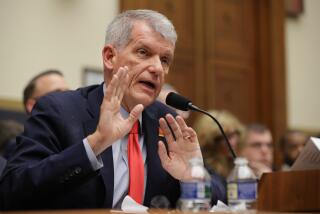Walton Seeks Sprint President’s Job
- Share via
In January, U.S. Sprint Communications paid Paul Walton $1.7 million to settle a legal dispute and get the 32-year-old San Diego entrepreneur out of its hair. It didn’t work.
Now Walton is needling the telecommunications company by mounting what he says is an earnest grass-roots campaign to take the job of Sprint President Robert H. Snedaker. If he succeeds in that seemingly quixotic effort, Walton promises to “clean house.”
On Monday, the campaign rolled into UCLA’s Myerhoff Free Speech area for a rally. The crowd was sparse, and a comedian, representatives of Jews for Jesus and Conservative Republican Bruins competed with Walton for the attention of the crowd milling about the sunny plaza.
Undeterred, Walton plunked down his suitcases and began his story of frustrations with a company that he once enthusiastically promoted.
Walton said he pursues the matter not only because of his personal dispute with Sprint but also out of concern for customers who he claims continue to be “duped” and plagued by the company’s acknowledged billing problems.
Walton eventually will head to Kansas City, Mo., where on April 12 he plans to appeal to shareholders of United Telecommunications, which is half owner of Sprint with GTE Corp. Meanwhile, the former high school English teacher is flying across the country trying to put pressure on the boards and shareholders of Sprint’s parent companies to oust the current management and put him in charge.
“Who knows? I may be talking to a student whose father is someone like Donald Trump or Carl Icahn. Someone with some real influence,” Walton said after Monday’s rally.
At UCLA, Walton put on display a six-foot blow-up of the $1.7-million check Sprint sent him to settle a dispute over commissions that he was due for signing up customers for the long-distance service.
The seeds of Walton’s dispute with Sprint were sown in 1984, when Walton quit teaching to get into the long-distance telephone business and sign a contract with one of Sprint’s predecessor companies. His young staff members soon were setting up card tables on street corners and college campuses all over the country, and they eventually signed up about 600,000 customers.
But Walton said he began having problems getting his proper commissions in early 1985. He said he was supposed to be credited as soon as customers he signed up made their first call on the service. However, he said, about half his recruits weren’t counted because they never got the service or it didn’t work once they were hooked up. In other cases, Walton said he lost out on commissions when Sprint’s flawed billing system failed to record some customers’ calls.
Walton was fired later that year, but continued to wage a tenacious battle against the company. After dozens of letters to Sprint’s management about problems in customer service and billings, he cornered John Birk, president of United Telecommunications’ long-distance unit, on a jet bound to Dallas from Chicago. Walton said he simply followed Birk’s limousine and bought the seat next to him just before the plane took off.
Walton claims that Sprint owed him between $3 million and $10 million, but he ultimately settled for a smaller amount to avoid a long lawsuit.
For its part, Sprint has said it plans to resolve its customer billing problems by January. But spokesman Syd Courson said that Walton’s campaign has nothing to do with the company’s efforts. Further, Courson said, many of Walton’s charges about the company’s customer relations practices are “ludicrous.”
“He is a nuisance,” Courson said.
More to Read
Inside the business of entertainment
The Wide Shot brings you news, analysis and insights on everything from streaming wars to production — and what it all means for the future.
You may occasionally receive promotional content from the Los Angeles Times.










